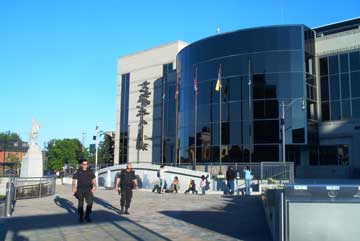THUNDER BAY – Editorial – Thunder Bay’s political scene is fascinating because it is often punctuated by issues that generate substantial controversy or excitement and then they proceed to fade away into obscurity and silence. Three recent ones come to mind:
1. When will construction start on the waterfront hotel and condos? While the waterfront has been a flurry of construction activity, all has been silent on exactly what new hotel is going to anchor the development and indeed when construction will start. I do recall a deputation to council some time ago by the developers asking for the height of the project to be increased but since then, there has been silence…Will there soon be a beacon of light?
2. What ever happened to the proposed hotel and mega Tim Horton’s development slated for the treed area at the corner of John and Junot? There was a rather heated public meeting with neighborhood residents on the issue and the issue was supposed to be discussed at June’s council meeting but since then nothing has been heard. The Mayor came out and stated he did not want to see the development go through in a residential neighborhood. Has the project been dropped or will the issue be quietly slipped into a meeting at a time of the year when people are preoccupied with other issues – say December with Christmas – and then quietly passed so construction can start in the spring? Will we hear an outcome soon or can we expect continued silence…
3. The provincial government’s Northern Growth Plan promised a “Policy Institute” to deal with Northern Ontario policy research and allow northerners to help craft their own regional policies. In March, TBNewswatch reported provincial dollars (5 million from the Heritage Fund) to fund the institute were announced and the presidents of Laurentian and Lakehead tasked to guide implementation. It apparently was even mentioned at the Think North II Summit. So what happened? Nothing has been announced yet. More ominously, Minister Gravelle’s four page Summer 2011 Newsletter does not even mention the northern Policy Institute once. All is quiet. All is calm. We are in the midst of the election and it has not even been re-promised. There is silence…
Democracy is supposed to be a process whereby otherwise ordinary people can participate in the decision making and governance of their society. Part of the process requires transparency with public issues, particularly when public money is involved. Given all the public money being spent on the waterfront development and the centrality of private sector investment to the development plan, when will we see construction of the condos and hotel begin? This is an important issue given that we are about to embark on another massive public sector project – the multiplex – that will also require public investment. Given the neighborhood impact of the proposed development on Junot and John and the neighborhood concern, when exactly will Council discuss it and a decision be rendered? Given the promises made by the provincial government towards a Northern Ontario Public Policy institute, why has it disappeared from local discussion? What has happened to the five million dollars earmarked for it? Does anyone know? Does anyone even care?
Livio Di Matteo
 Livio Di Matteo is an economist in Thunder Bay, Ontario specializing in public policy, health economics, public finance and economic history. Livio Di Matteo is a graduate of the Fort William Collegiate Institute (1898-2005) whose school motto “Agimus Meliora” has served as a personal inspiration. Livio Di Matteo holds a PhD from McMaster University, an MA from the University of Western Ontario and an Honours BA from Lakehead University. He is Professor of Economics at Lakehead University where he has served since 1990. His research has explored the sustainability of provincial government health spending, historical wealth and asset holding and economic performance and institutions in Northwestern Ontario and the central North American economic region. His historical wealth research using census-linked probate records is funded by grants from the Social Sciences and Humanities Research Council of Canada. He has constructed, assembled and analyzed nearly 12,000 estate files for Ontario over the period 1870 to 1930. Livio Di Matteo writes and comments on public policy and his articles have appeared in the National Post, Toronto Star, the Winnipeg Free Press and Thunder Bay Chronicle-Journal and NetNewsledger.com. Livio Di Matteo has had an entry in Canadian Who’s Who since 1995.
Livio Di Matteo is an economist in Thunder Bay, Ontario specializing in public policy, health economics, public finance and economic history. Livio Di Matteo is a graduate of the Fort William Collegiate Institute (1898-2005) whose school motto “Agimus Meliora” has served as a personal inspiration. Livio Di Matteo holds a PhD from McMaster University, an MA from the University of Western Ontario and an Honours BA from Lakehead University. He is Professor of Economics at Lakehead University where he has served since 1990. His research has explored the sustainability of provincial government health spending, historical wealth and asset holding and economic performance and institutions in Northwestern Ontario and the central North American economic region. His historical wealth research using census-linked probate records is funded by grants from the Social Sciences and Humanities Research Council of Canada. He has constructed, assembled and analyzed nearly 12,000 estate files for Ontario over the period 1870 to 1930. Livio Di Matteo writes and comments on public policy and his articles have appeared in the National Post, Toronto Star, the Winnipeg Free Press and Thunder Bay Chronicle-Journal and NetNewsledger.com. Livio Di Matteo has had an entry in Canadian Who’s Who since 1995.
This article was originally posted on Livio Di Matteo’s NORTHERN ECONOMIST Blog at http://ldimatte.shawwebspace.ca.


